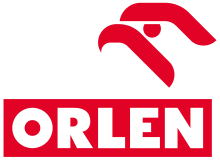| Revision as of 18:36, 20 August 2011 editAppleseed (talk | contribs)13,167 editsmNo edit summary← Previous edit | Revision as of 18:39, 20 August 2011 edit undoAppleseed (talk | contribs)13,167 editsmNo edit summaryNext edit → | ||
| Line 62: | Line 62: | ||
| * {{official|http://www.orlen.pl/}} | * {{official|http://www.orlen.pl/}} | ||
| {WIG20 components}} | {{WIG20 components}} | ||
| {{Use dmy dates|date=September 2010}} | {{Use dmy dates|date=September 2010}} | ||
Revision as of 18:39, 20 August 2011
 | |
| Company type | Public (WSE: PKN) |
|---|---|
| Industry | Oil and Natural Gas |
| Founded | Płock, Poland (1999) |
| Headquarters | |
| Key people | Dariusz Jacek Krawiec Executive Chairman |
| Revenue | |
| Operating income | −6,330,000,000 złoty (2022) |
| Net income | |
| Total assets | 272,327,000,000 złoty (2022) |
| Number of employees | 24,113 (2007) |
| Website | www.orlen.pl |
PKN Orlen (Template:Lang-pl) is a major European oil refiner, and petrol retailer. The company is Poland's and Central Europe's largest publicly traded firm with major operations in Poland, Czech Republic, Germany, and the Baltic States. In 2009, it was ranked in the Fortune Global 500 as the world's 31st largest oil company and the world's 249th largest company overall, and was the only Polish company ranked by Fortune. However, it dropped as low as to the position of 398 by the year 2010<.ref>Poland by Fortune GLobal 500</ref>
Establishment
The firm was created through the merger of Poland's two communist oil monopolies. PKN Orlen has its roots in the creation of C.P.N., Communist Poland's petroleum retail monopoly in 1944. In the 1950s, the second block of PKN Orlen was formed, Petrochemia Płock, a state firm in charge of the refineries in Płock and grew to become the largest complex of its kind in Poland. After the merger of CPN and Petrochemia Plock, the company was renamed into Polski Koncern Naftowy (PKN), with Orlen added several months later as the consortium's brand name. The new name is derived from Orl- for "orzeł" (Polish: eagle) and its adjective "orli", and -en for "energia" (Polish: energy).
Privatization and Orlengate
Main article: OrlengateIn 1999, both firms were partially privatized and merged to create a retail and refining company under the name PKN Orlen.
Orlengate is the biggest corruption scandal in the modern political history of Poland. It happened during the rule by the leftist government of the postcommunist party SLD (Sojusz Lewicy Demokratycznej, Democratic Left Alliance). Disclosed in 2004, the scandal started with the arrest on 7 February 2002 by the UOP (Office for State Protection) of Andrzej Modrzejewski, the CEO of PKN Orlen.
Today
Today, Orlen is the largest fuel retailer in Poland with over 2000 locations. The company runs the most advanced and the second largest complex for terephthalic acid production in Europe. It also has significant investment abroad including the buy out of Mažeikių Nafta and a majority stake in Unipetrol, a Czech refiner. In 2003 PKN Orlen had the chance to acquire 500 filling stations in Northern Germany from BP under premise of an anti-competition rule when BP took over Aral. As of 2007 PKN Orlen has 581 filling stations in Germany (484 under the Star brand, 58 under the Orlen brand and 29 under a supermarket brand).
PKN Orlen was involved in merger talks with MOL Group, a Hungarian oil company in 2005. If merged, the two firms would have created a regional giant, and controlled much of Central Europe's oil industry. However, the planned merger failed due to high politicization. Following the dropped merger plans, PKN Orlen bought a majority stake in Czech Unipetrol. During May 2006, the company announced its largest investment ever when it took over a majority share of Lithuania's Mažeikių Nafta, the largest company in the Baltic States, from Yukos. With the completion of the takeover, PKN Orlen became Central Europe's largest company.
PKN Orlen, under a joint venture with the Netherlands firm Basell, also owns Poland's largest plastics company.
In 2007, it was ranked 432 in the Fortune Global 500 and 679 in the Forbes Global 2000 list of companies. Orlen employs over 24,000 people in 4 countries.
Brands and subsidiaries of Grupa Orlen (PKN Orlen Group)

- Basell Orlen Polyolefins (Plastics and synthetic materials)
- Orlen (Polish and German market petrol station brand)
- Star (German market petrol station brand)
- Petrochemia Płock (Polish market brand)
- PetroProfit (Polish market brand)
- PetroZachod (Polish market brand)
- Arge (Polish market brand)
- UniPetrol (Czech national petrol firm)
- Benzina (Unipetrol retail chain)
- Solino (Industrial brine manufacturer)
- Anwil (Polish chemical firm)
References
- ^ www.bankier.pl. "PKN Orlen - skonsolidowany raport roczny".
- Fortune Global 500 - money.cnn.com
- http://www.orlen.pl/EN/InvestorRelations/Pages/LaunchofEurope%E2%80%99smostadvancedPXPTAcomplex.aspx
- The Global 2000 - Forbes.com
- FORTUNE Global 500 2007: Countries - Poland
See also
External links
Categories: